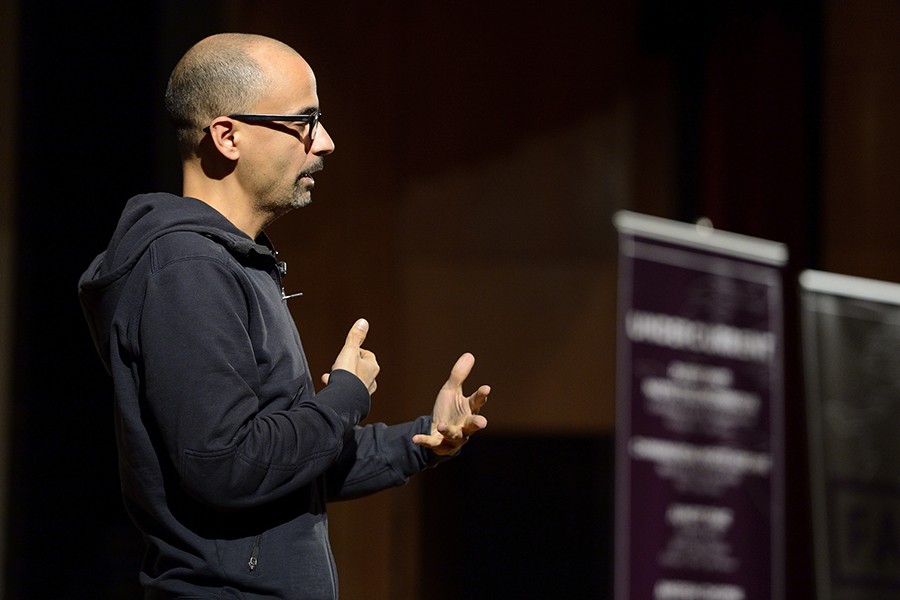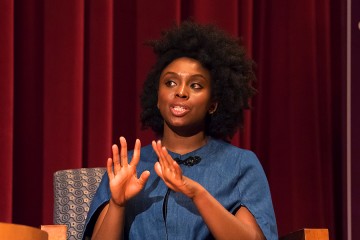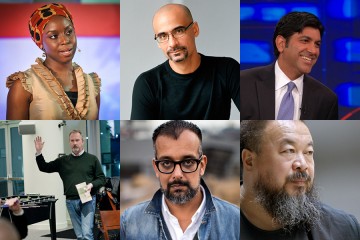Pulitzer Prize-winning writer Junot Díaz offered a preview of his next novel Wednesday night. It was not a look at specific plot details, but a glimpse of the story's ideological stirrings—the ideas of walls, fear, and exclusion.
In his charged talk at Johns Hopkins University as part of the student-run Foreign Affairs Symposium, Díaz commanded the crowd with blunt pronouncements, quick humor, and plenty of F-bombs.
He said his next book is an exploration of what happens "when the hegemonic system begins to create, without any evidence, a zombie movie." In a framework that denies understanding or compassion to "the dangerous, cannibalistic 'racial other,'" he said, "the only thing you can do is exclude them or kill them."
The Dominican-American writer, who won the MacArthur 'genius' grant in 2012, said he embarked on these topics before the presidency of Donald Trump, but they've only increased in relevancy.
"In some ways I didn't know I was writing about Trump, and then Trump happened," he said.
For Díaz, activism came before writing and continued during and after his rise to fame.
"In many ways, [activism] was more important to my identity," he said.
He serves as an honorary chairman of the DREAM Project, a program promoting education equality in his home country of the Dominican Republic, and he's involved in various political groups in both that country and the U.S.
The writer said it's his norm to develop his books "from a set of questions, most of them political questions, that end up driving the creative function."
For The Brief Wondrous Life of Oscar Wao, the 2007 novel that vaulted him to worldwide attention and won him the Pulitzer, Díaz said his "animating questions" dealt with the centuries-old machineries of plantations that excluded "people of African descent … from the concept of love and intimacy."
His latest preoccupations, informing his new novel, include the flaws of neoliberalism and America's "obsessive creed of building walls."
Díaz said his experiences as a teacher—he's currently a creative writing professor at the Massachusetts Institute of Technology—have opened his eyes to the cultural forces shaping current generations.
Growing up in New Jersey after immigrating from Santo Domingo, Díaz said he was encouraged "to have friends from every age group," forming valuable cross-generational relationships.
"The kind of freedom I was given was bananas, y'all," he said.
But in recent decades, Díaz said he's seen "a saturation of fear"—a fear "that strangers were going to kidnap and destroy us"—so that children now can only interact with their elders as "part of an adult containment system selected for them."
Compounding this culture of fear, he believes, is the tendency of neoliberal systems "to create a couple of winners, and endless amount of losers," thereby breeding constant insecurity and envy.
After 9/11, Díaz said, fear became the "central American religion," which may explain the preoccupation with walls.
"By their nature, walls imagine an invader," he said. "And that invader is always imagined as less human than the folks who build the walls and [who] the walls are protecting."
When several audience members asked Díaz about how people of color should navigate through white-dominated systems, he stressed that it is "absolutely vital that we begin to do a lot of internal work," because "these hegemonic systems, they replicate inside of us," and that "one never fully decolonizes."
But there is no process "more joyous," he added, than finding a way "to liberate one corner of ourselves."
Posted in Arts+Culture, Voices+Opinion, Politics+Society
Tagged politics, foreign affairs symposium, writing











